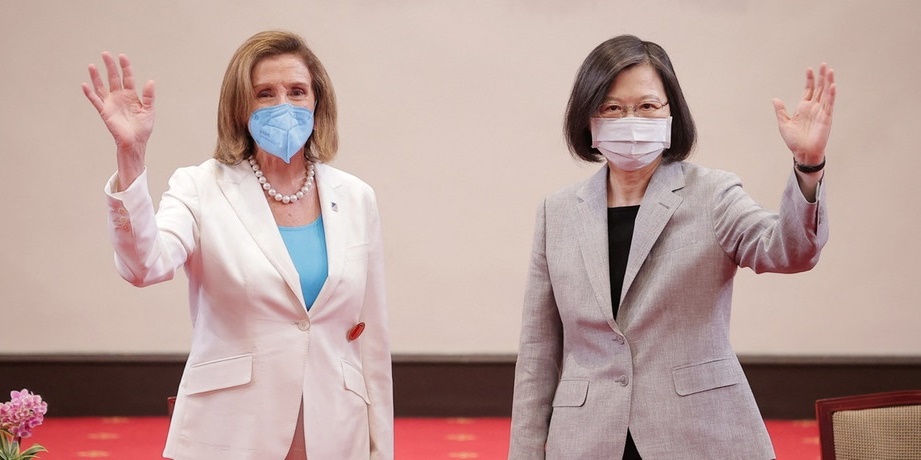
The US would “not give up its commitment to Taiwan”.
US top politician Nancy Pelosi demonstratively backed Taiwan during her visit to Taipei. She and her delegation traveled to Taiwan “to make it absolutely clear that we will not give up our commitment to Taiwan,” said the Speaker of the US House of Representatives at a meeting with Taiwan President Tsai Ing-wen in the capital. The visit is also a sign “that we are proud of our enduring friendship”.
Referring to Beijing’s communist leadership’s threats against Taiwan, Pelosi said, “More than ever, American solidarity is crucial.” That is the message of the visit of their congress delegation. US support for Taiwan is bipartisan. “Today the world faces a choice between democracy and autocracy,” Pelosi said, praising Taiwan as “one of the freest societies in the world.”
“Taiwan will not back down”
President Tsai said Taiwan will not back down in the face of Chinese threats. Amid “increased military threats, Taiwan will not back down,” the president said. Taiwan will hold “the line of defense of democracy.” “We will do whatever is necessary to strengthen our self-defense capabilities.”
Despite all the threats from Beijing, the top politician had arrived in the democratic island republic the day before for the highest-ranking visit from the USA in a quarter of a century. Beijing sees Taiwan only as part of the People’s Republic, strictly rejects official contacts from other countries to Taipei and had vehemently warned the USA against Pelosi’s trip to Taiwan.
Japan concerned about Chinese military maneuvers
In response, China’s People’s Liberation Army immediately launched maneuvers in six sea areas surrounding Taiwan. There should also be “extensive shooting practice” until Sunday. The maneuvers are considered the greatest military muscle flexing since the missile crisis of 1995, when China fired missiles over Taiwan to intimidate and the US sent two aircraft carrier groups.
The sea areas for the exercises go well beyond the restricted zones at the time, reach close to Taiwan and sometimes appear to be encroaching on its sovereign territories. Experts also expect that shipping routes could be affected.
China’s military maneuvers raised concern in Japan. The area near Taiwan where China is planning maneuvers overlaps with Japan’s exclusive economic zone, Japan’s government spokesman Hirokazu Matsuno said, according to Kyodo News Agency. Concerns have been communicated to Beijing. Like its protecting power, the United States, Japan has long been concerned about Beijing’s increasing bid for power in the region.
Beijing summons US ambassador
In protest at Pelosi’s visit, the State Department in Beijing summoned US Ambassador to Beijing Nicolas Burns. Vice Foreign Minister Xie Feng spoke of a “serious provocation and a violation of the one China principle,” state media reported.
As a further reaction, China’s People’s Liberation Army sent 21 planes into Taiwan’s Air Surveillance Zone (ADIZ) on Tuesday alone, the Defense Ministry in Taipei reported. These provocations have recently increased sharply, but the high number is unusual. It was about fighter jets and aircraft for air surveillance or electronic warfare.
“No change to ‘One China Policy'”
Tensions with China notwithstanding, the visit to Taiwan itself is largely welcomed. The stay is considered an appreciation of the island republic. In Taipei, it was also seen as a setback for Beijing, which is trying to isolate Taiwan internationally.
Cross-party Taiwanese parliamentarians welcomed 82-year-old Pelosi. Kuomintang MP Chen Yi-hsin said he hoped Beijing would not “overreact”. Pelosi represents Congress and the people of the United States, but not US President Joe Biden, he told CNA. Her visit does not represent a change in the US’s “one China policy,” which recognizes Beijing as China’s only legitimate government.
White House warns China
The White House warned Beijing of an escalation. “There is no reason for Beijing to turn a possible visit, consistent with longstanding US policy, into a crisis or conflict,” said Security Council communications director John Kirby. The US would not engage in “saber rattling.” “At the same time, we don’t let ourselves be intimidated.”
According to him, the visit does not change “anything” about the USA’s China policy. The US does not maintain official diplomatic relations with Taiwan, but considers Beijing to be China’s only legitimate government.
China and Taiwan: Common History, Big Differences
Which countries recognize Taiwan as a state?
What Pelosi’s visit to Taiwan means
US leader Pelosi landed in Taiwan


